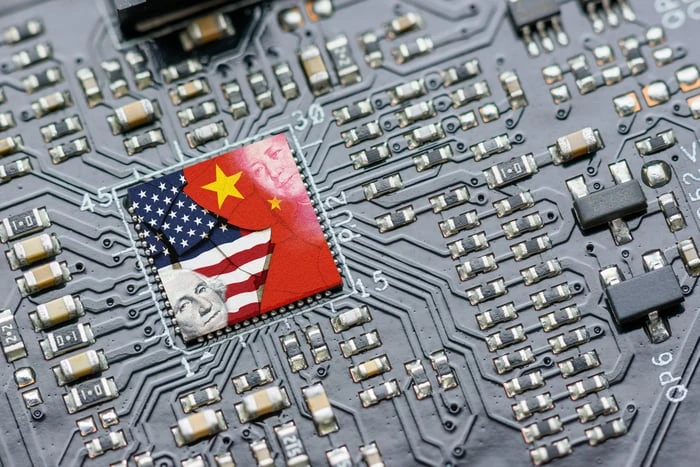Shares of artificial intelligence (AI) companies took a hit on Monday, influenced by geopolitical risk factors. According to S&P Global Market Intelligence data, Intel’s stock decreased by 2.00%, Broadcom’s by 4.05%, and Arm’s by 4.96%, finishing the session down by 2%, 4.1%, and 5%, respectively. Meanwhile, Nvidia’s shares fell by 2.3%, and Micron’s by 3.8%.
Investors in the semiconductor sector faced negative news on various geopolitical fronts today. Although China has been circumventing AI technology restrictions imposed by the United States, this was not the day’s most unexpected development.
Notably, a Chinese military aircraft violated Japanese airspace this morning, marking an unprecedented intrusion. This incident followed several occurrences involving Chinese planes in the Philippines, which have raised alarms. Adding to the geopolitical tension, Poland announced it believes a Russian aircraft encroached on its airspace.
Geopolitical risk was at the forefront on Monday.
In an effort to curb the technological progression of its primary geopolitical adversary, the U.S. has implemented restrictions to block the sale of advanced chips and semiconductor manufacturing equipment to China. However, The Wall Street Journal reported today that China has been utilizing third-party AI processing services to bypass these export limitations.

Dominance in the artificial intelligence sector has emerged as a crucial economic and national security focus for both the U.S. and China. The quest for leadership in this field could further escalate tensions between these global powers.
While recent reports of Chinese incursions in Japan and the Philippines are causing immediate territorial concerns, the looming threat for investors is the potential for China to invade Taiwan in the foreseeable future. Although many companies are developing their own AI chips and processors, Taiwan Semiconductor Manufacturing Company (TSMC) currently produces approximately 80% of the semiconductors required for advanced AI applications. Any disruption or seizure of TSMC’s chip production could have devastating effects on supply chains and the global economy at large, potentially triggering a broader conflict.
Beyond developments related to China, investors are also considering other geopolitical risks. Poland noted that a Russian aircraft had entered its airspace en route to Ukraine, heightening fears of escalating tensions in the region. Additionally, reports emerged of a security alert at a NATO military base in Germany last week, prompted by intelligence suggesting Russia might be planning to sabotage the base with drones.
What’s the outlook for Intel, Broadcom, Arm, and other AI chip stocks?
News from China has been a persistent bearish factor for chip stocks over the past year, and it’s likely that geopolitical risk will remain a dominant influence on short-term market volatility. Companies heavily reliant on TSMC for chip production might experience significant bearish trends if the perceived risk of conflict in Asia heightens. This situation might explain why Intel experienced a smaller decline compared to Broadcom, Arm, and other AI stocks today.
Although Intel collaborates with TSMC for manufacturing some of its cutting-edge chips, it also possesses significant fabrication capabilities of its own. Intel ranks as the third-largest chip fabricator globally, following only the Taiwan-based leader and Samsung. With rising concerns of a potential Chinese invasion of Taiwan, the U.S.-based company is investing heavily to enhance its fabrication abilities and position itself as an alternative to TSMC. Nevertheless, even Intel may not avoid significant sell-offs if China seeks control over Taiwan and TSMC.
While geopolitical risks will continue to impact valuations for semiconductor companies and other AI entities, the next major market-moving catalyst may be closer at hand. Nvidia is set to announce its second-quarter earnings results after the market closes on Wednesday, potentially marking one of 2024’s most impactful financial disclosures.
Nvidia’s performance and stock movements have often affected trading for other AI stocks this year, and it’s likely the upcoming earnings report will have ripple effects for other players in the field. If Nvidia’s quarterly outcomes and future projections surpass Wall Street’s expectations, other AI stocks could see substantial valuation increases. However, expectations are high, and even minor disappointments could lead to considerable volatility.
Should you invest $1,000 in Intel right now?
Before investing in Intel, consider this:
The Motley Fool Stock Advisor analyst team has just pinpointed what they believe are the 10 best stocks for investors to purchase right now, and Intel wasn’t among them. The selected 10 stocks could deliver significant returns in the coming years.
Reflect on when Nvidia was added to this list on April 15, 2005… an investment of $1,000 at the time of our recommendation would now be valued at $792,725!
It’s essential to note that Stock Advisor’s total average return is 765% — considerably outperforming the market compared to the S&P 500’s 165%.




